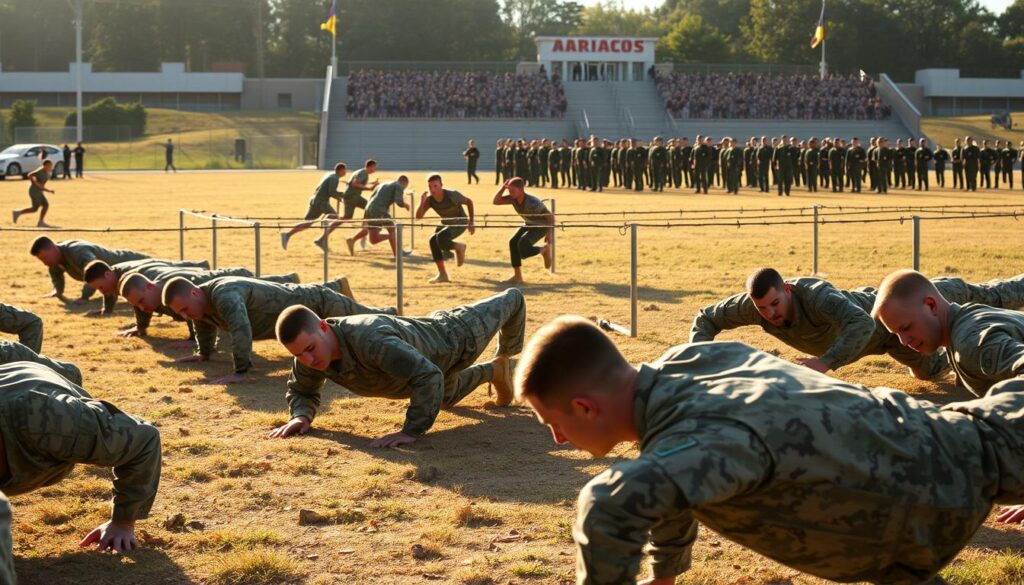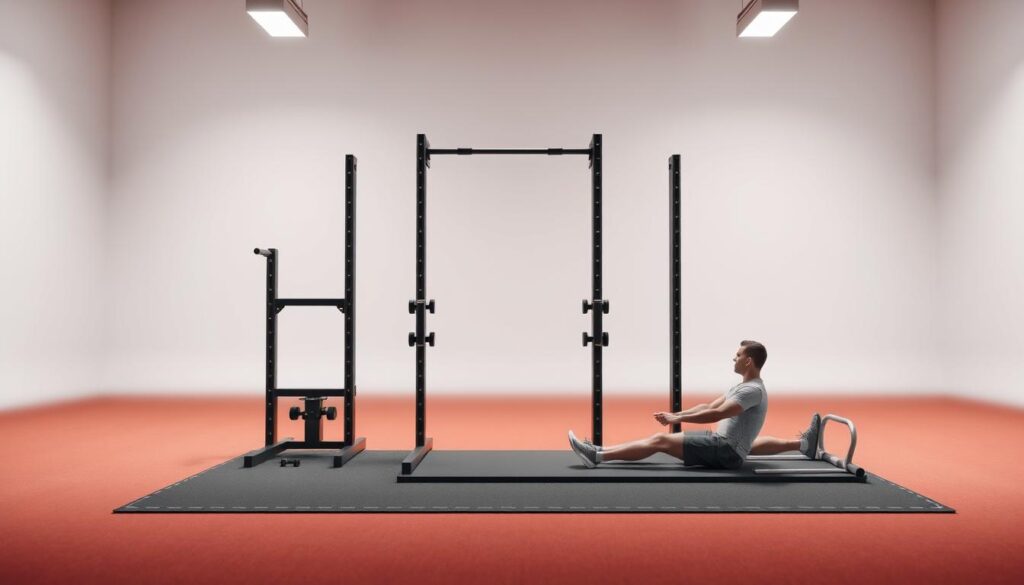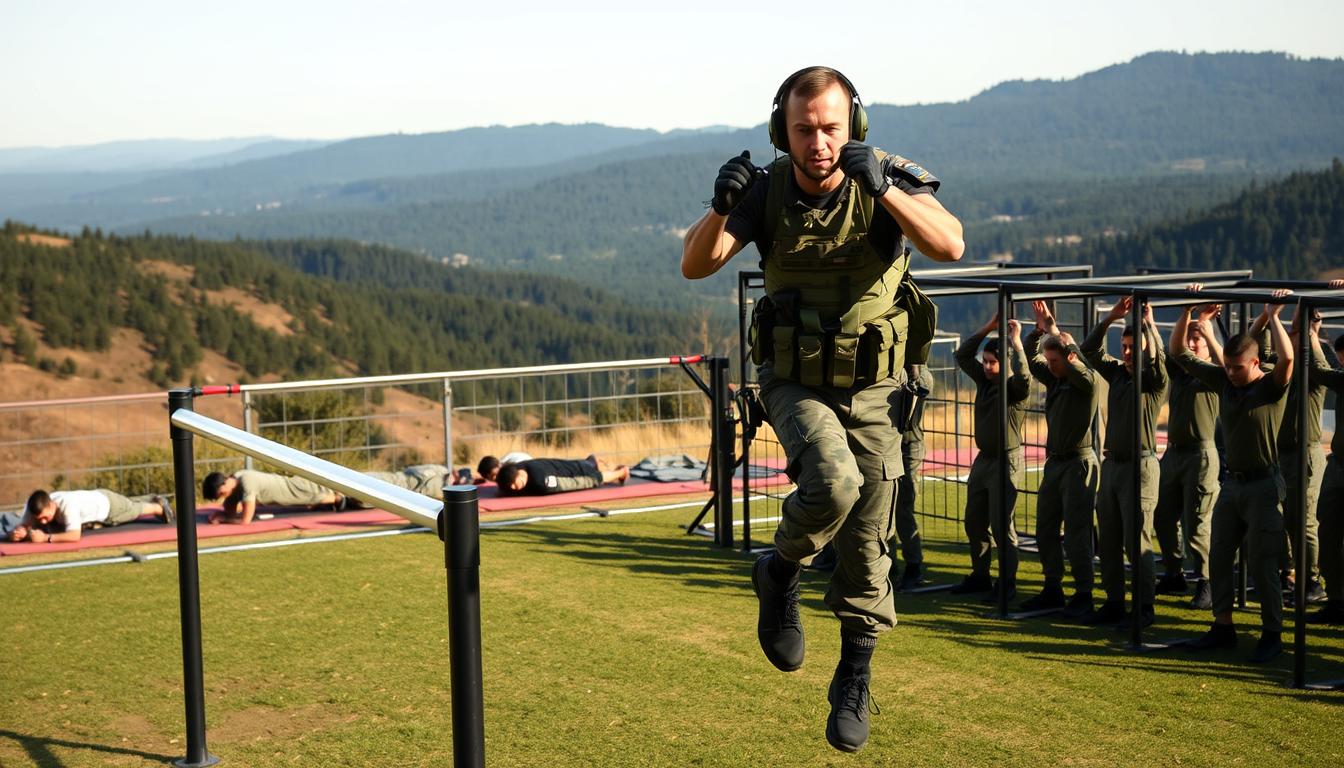Do you know what soldiers in the United States must do to pass the military fitness assessment? This test is key to checking if soldiers are ready for duty.
The test checks muscular strength, endurance, and how well the heart and lungs work. It has three parts: doing push-ups, sit-ups, and running two miles. These tests show how well a soldier can handle physical tasks.
Key Takeaways
- Understanding the importance of the military fitness assessment in the US Army.
- Knowing the three events that comprise the assessment.
- Recognizing the role of the assessment in evaluating soldiers’ readiness.
- Familiarity with the standards for passing the assessment.
- Awareness of the significance of muscular strength, endurance, and cardiovascular fitness.
Overview of the Army Physical Fitness Test
The Army Physical Fitness Test (APFT) is key to checking if soldiers are ready for duty. It makes sure soldiers can do their jobs well and safely. The APFT looks at strength, endurance, and how well the heart and lungs work.
For more information on the Army’s fitness programs, you can visit the official Army website at https://www.army.mil/aft.
Purpose of the Test
The APFT checks a soldier’s fitness level and spots areas for improvement. It helps track progress and makes sure soldiers are ready for military life. It tests strength, endurance, and heart and lung health, giving a full picture of fitness.
Importance of Physical Fitness in the Army
Being fit is crucial for soldiers to do their jobs well and safely. It lowers injury risk and boosts readiness. Good fitness is key for tasks in training or combat. The APFT motivates soldiers to stay fit and get better.
| Component | Description | Importance |
|---|---|---|
| Push-Ups | Assesses muscular strength and endurance of the upper body | Essential for tasks requiring upper body strength |
| Sit-Ups | Evaluates muscular strength and endurance of the core | Critical for maintaining posture and performing tasks that require core strength |
| Two-Mile Run | Measures cardiovascular respiratory fitness | Vital for sustained activities over a period |
The APFT is a comprehensive assessment that evaluates a soldier’s overall physical fitness. Knowing the APFT’s parts and why they matter helps soldiers get ready for military life.

Components of the Army Physical Fitness Test
The Army Physical Fitness Test (APFT) checks a soldier’s physical readiness in three ways. Knowing these parts is key for soldiers to get ready and score well.

Push-Up Assessment
The push-up test looks at upper body strength and endurance. Soldiers do as many push-ups as they can in two minutes. They must follow strict rules to keep their form right. This test is important because it shows a soldier’s upper body strength.
Sit-Up Assessment
The sit-up test checks abdominal and hip flexor strength. Soldiers aim to do as many sit-ups as they can in two minutes. They must stick to specific rules for the right form. This part is key for checking core strength, which is vital for fitness and stability.
Two-Mile Run
The two-mile run tests cardiovascular fitness and endurance. Soldiers try to finish the run as fast as they can. This shows their aerobic fitness. It’s important because it checks if a soldier can keep going during long tasks.
As military training shows, “Physical fitness is a key part of being ready for duty.” The APFT’s three parts together give a full picture of a soldier’s physical skills. This makes sure they’re ready for military life.
Scoring System for the APFT
To succeed in the APFT, soldiers need to know the scoring system. It checks their fitness in three areas: push-ups, sit-ups, and a two-mile run. This system makes sure the test is fair and accurate.
Grading Scale for Each Event
The APFT uses a point system, with scores from 0 to 100 for each event. The scale considers the soldier’s age and gender. This makes the test fair for everyone.
For example, push-ups are scored by how many are done in two minutes. Sit-ups and the two-mile run also have time limits. These tests check different parts of fitness.
Minimum Requirements by Age and Gender
To pass the APFT, a soldier must score at least 60 in each event. They need a total of 180 points across all three. The Army has tables that show the minimum scores for different ages and genders.
| Age Group | Gender | Push-ups (min) | Sit-ups (min) | 2-Mile Run (max) |
|---|---|---|---|---|
| 17-21 | Male | 38 | 42 | 13:42 |
| 17-21 | Female | 19 | 42 | 16:42 |
| 22-26 | Male | 36 | 40 | 14:12 |
| 22-26 | Female | 19 | 40 | 17:12 |
Knowing these requirements helps soldiers plan their training. They can focus on improving their performance in each event. This way, they can get a good score in the APFT.
Preparatory Steps for the APFT
To do well in the APFT, a good training plan and recovery methods are key. Soldiers need to work on physical training, nutrition, and rest. This approach helps them perform their best.
Recommended Training Regimens
A balanced training plan is essential for APFT success. Exercises that boost strength, endurance, and heart health are important. This includes:
- Push-ups to build upper body strength
- Sit-ups to enhance core strength
- Running to improve cardiovascular endurance
For more information on APFT requirements, check out the Army’s official website.
| Exercise | Repetitions/Recommended Duration | Benefits |
|---|---|---|
| Push-ups | Max in 2 minutes | Upper body strength |
| Sit-ups | Max in 2 minutes | Core strength |
| 2-Mile Run | Complete as fast as possible | Cardiovascular endurance |
Nutrition and Recovery Tips
Good nutrition and recovery are crucial for APFT prep. A balanced diet with proteins, carbs, and fats is key. Drinking enough water is also important.
“Nutrition is a critical component of a soldier’s performance. A well-balanced diet provides the energy needed for training and aids in recovery.”
Rest, stretching, and sleep are also vital. Taking enough time to recover between workouts can greatly improve performance.
Special Considerations
The Army knows that everyone needs special care during the physical fitness test. This makes sure all soldiers, no matter their job or health, are treated fairly.
Accommodations for Injuries
Soldiers with injuries or health issues might get special help or different tests. The Army has rules for these special cases. This way, soldiers aren’t held back by things they can’t control.
- Temporary profiles for soldiers with short-term injuries
- Permanent profiles for soldiers with long-term or chronic conditions
- Alternative events for soldiers who cannot participate in standard APFT events
For more info on how standards vary, check out why the Army HT WT calculator has different standards for men and women.
Testing Variations for Different Roles
Each Army role might need special tests or changes to check if a soldier is fit for their job. This includes:
- Special Forces: Additional endurance tests
- Combat Roles: Emphasis on strength and agility
- Support Roles: Focus on overall fitness and stamina
Knowing these special rules helps soldiers get ready for the APFT. It ensures they meet the standards needed for their role.
Frequently Asked Questions
The Army Physical Fitness Test (APFT) is key for a soldier’s career. It’s important to know what it requires. Many soldiers wonder about the test, its parts, and what happens if they fail.
What Happens if I Fail the APFT?
Failing the APFT can lead to serious issues for soldiers. Army weight standard guidelines say failing might mean retaking the test or facing disciplinary actions. The exact outcome depends on the soldier’s unit and the reasons for failing.
Some possible outcomes of failing the APFT include:
- Retaking the test
- Administrative action, like counseling or a reprimand
- Effects on promotions and special roles
How Often is the APFT Conducted?
The APFT’s frequency changes based on the unit and role. Usually, it’s done at least twice a year. But, some units might test more often. Soldiers need to be ready to test regularly to keep their fitness up and avoid problems.
Soldiers must know the army PT test regulations and army fitness assessment criteria to prepare well for the APFT. By staying fit and informed, soldiers can pass the test and move up in their careers.
Recent Changes to the APFT
The US Army has made big changes to its fitness test. They replaced the Army Physical Fitness Test (APFT) with the Army Combat Fitness Test (ACFT). This change is because combat has changed a lot, and they need a better way to check if soldiers are ready.
Introduction to the New Evaluation Standards
The ACFT is meant to better check if soldiers are ready for combat. It looks at different parts of physical fitness that are important in today’s wars. The test includes challenges that are more like what soldiers face in combat.
Impact on Soldier Training
The ACFT has big effects on how soldiers train. Now, training focuses more on being ready for combat’s physical needs. The test includes more types of challenges, making sure soldiers can face today’s war demands. Training programs have also changed to get soldiers ready for the ACFT.

